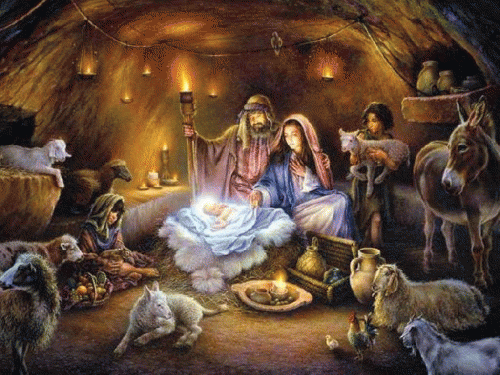Christmas. This decorative day of gift-giving festivities and feasting celebration captures our imaginations like no other. It's a day infused with enormous imaginative power; a day that gives us both the miraculous virgin birth of the only son of the creator of the universe, as well as the glad tidings of a telepathic philanthropic toymaker with the inside track on every child's heart's desire and the supernatural means of delivering on those desires. For both children and adults alike, Christmas is a day when great leaps of imagination and faith abound.
If intentions ruled the day, Christmas would also be a day when some of the very best of what humanity has to offer would be found abundantly on display. On this day truth and love reach out to take hold of us with great abandon. Unfortunately, with falsehood and fear having already staked their claim, and not quite ready to let us go, Christmas is something of a mixed bag. Christmas promises unity, peace, and joy, but all too often it is division, conflict, and suffering that's found in the pursuit of that promise; the latter trio surreptitiously making its way into our lives deceptively and invitingly gift-wrapped in the former.
The Many Faces of Christmas
The meaning and significance any given day holds out on offer is different for each of us, and Christmas is no exception. There are a great many people who celebrate Christmas as a secular holiday. There are also a great many people for whom Christmas is held out as a special day of remembrance, honoring the birth of Jesus and paying tribute to his enormous spiritual legacy. And there are also those who choose not to celebrate Christmas at all. Those for whom Christ assumes an important and even central role in their spiritual beliefs and practices can be found among each of these groups, as can both Christians and non-Christians. There are no clear lines of demarcation here. Lots of overlap.
There's one group of people that I left out of this mix: self-proclaimed Christians who feel threatened by what they perceive as a "War on Christmas." They tell us there is a growing movement afoot with the diabolic aim of taking Christ out of Christmas and destroying Christmas as a distinctive Christian holiday.
On the Billy Graham website, son, Franklin Graham, is quite adamant about this as he laments how "the last few decades has witnessed increased hostility toward the sacred nature of Christmas." Graham offers an explanation that he believes goes right to the heart of the matter:
...at its root and core, the war on Christmas isn't really about Christmas, it's about the Son of God. The war on Christmas is a war on Christ and his followers... The Name of Christ is an offense to the unbelieving world. The mention of His birth, or life, or death and resurrection, is an insult.
That's quite a persecutory mouthful. And it's not surprising. For a great many Christians, the feeling of being persecuted is an integral part of what it means to be a Christian. To be persecuted for one's Christian beliefs is regarded as something of a rite of passage. It's worn like a badge of honor, and, if Graham's "war on Christmas" is any indication, Christians are apparently highly motivated to find that badge just about anywhere. Here, we find Graham magically conjuring it up literally out of thin air.
But, however persecuted Graham may feel, and however offended he may be, he rests assured, and assures his fellow Christians, that "the war on Christmas -- the war on Christ -- is doomed to fail." He reminds us that Jesus "is coming a second time to establish His kingdom forever under His righteous reign," at which time the true meaning and value of Christmas will be restored, and the proper manner of its celebration acknowledged and honored.
Next Page 1 | 2 | 3 | 4 | 5 | 6 | 7
(Note: You can view every article as one long page if you sign up as an Advocate Member, or higher).






